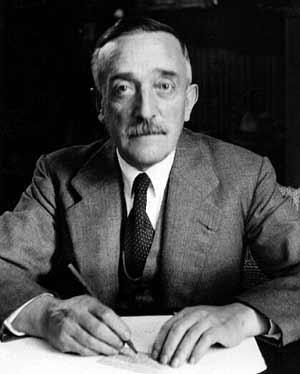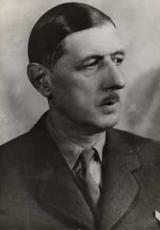Henri Queuille

Son of François Queuille and Marie Masson de Saint-Félix, Henri was born into a bourgeois family in the provinces.
When his father, a chemist, died in 1895, the Queuilles moved to Tulle where the teenager attended the lycée starting in 1896. The young graduate studied medicine in Paris, where he made friends with Maurice Bedel and Georges Duhamel, before moving back to his home town in 1908. In 1910, he married Margueritte Gratadour de Sarrazin, with whom he had two children – Suzanne and Pierre. He rapidly rose in politics: member of the town council in 1912, mayor and general councillor of the Corrèze department the following year, and member of Parliament in 1914.
During the First World War, his service as a doctor with various ambulances on the Eastern Front earned him the Croix de Guerre 14-18.
A moderate member of the Radical Party, he entered the government of Alexandre Millerand in July 1920 as Undersecretary for Agriculture. Recognised by his peers, he held many ministerial portfolios (Agriculture, Health, Post, Public Works, Supplies), being appointed minister nineteen times between 1920 and 1940. He was the main driving force behind French agricultural policy between the wars (creation of rural engineering, creation and organisation of agricultural education, technical development of the countryside, etc.); he notably presided over the Fédération Nationale de la Mutualité et de la Coopération Agricole (National Federation of Reciprocity and Agricultural Cooperation).
He nationalised the railways and created the SNCF (French National Railway Company), and headed the Office National des Mutilés, Combattants, Victimes de Guerre et Pupilles de la Nation (1937). In 1939 he published Le Drame agricole: un aspect de la crise économique.
A staunch supporter of the Republic who worked with the Socialists, he became close with Edouard Herriot, but refused to vote to hand over full powers to Maréchal Philippe Pétain on 10 July 1940. He was then removed from his functions as mayor of Neuvic. His son Pierre’s membership in the Resistance made his contacts with Free France easier. Hettier de Boislambert convinced him to leave for the United Kingdom.
He reached London in April-May 1943, along with Astier de la Vigerie, Daniel Mayer and Jean-Pierre Levy, despite his distrust of de Gaulle. In May, he sent out a call to the French peasantry over the BBC, and was then appointed President of the landing commission in charge of developing the measures to be taken upon the Liberation of France. Two months later, the Vichy government issued a decree stripping Henri Queuille of his French nationality and his mandate as Senator. In August, he left for Algiers, where de Gaulle, bringing together the political parties, brought him into the Comité Français de Libération Nationale (CFLN - French Committee of National Liberation) in November 1943. Queuille asked to be relieved of his functions in September 1944, when the government moved to Paris, to return to his political career. He was elected mayor in October 1945, then member of Parliament in the legislative elections of 1946.
The war memoirs written by this recipient of the Médaille de la Résistance were published in Journal 1939/1945.
Loyal to Edouard Herriot, he headed the government of the 4th Republic between July 1948 and June 1954. He was President of the Council (Premier) three times, curbing social unrest, the rise of Gaullism and government instability, applying a policy people called “immobilism”; he did not hesitate when it came to using force (October-November 1948) and postponing elections. But this policy enabled the Republic to survive.
His foreign policy activities led to the signature of a Franco-Vietnamese agreement in March 1949, practically recognising the colony’s independence, made France a member of the Atlantic Alliance and implemented the Marshall Plan the following month.
Defeated in the legislative elections of 1958, Henri Queuille returned to life in local politics. He transformed his town into a leisure resort, set up an agricultural high school and a technical school. Pursuing work on his memoirs that he had started in 1944, he gathered archives, documents, eye-witness accounts and objects from the Second World War and the Resistance, thus comprising the main collection of the Museum that bears his name.


